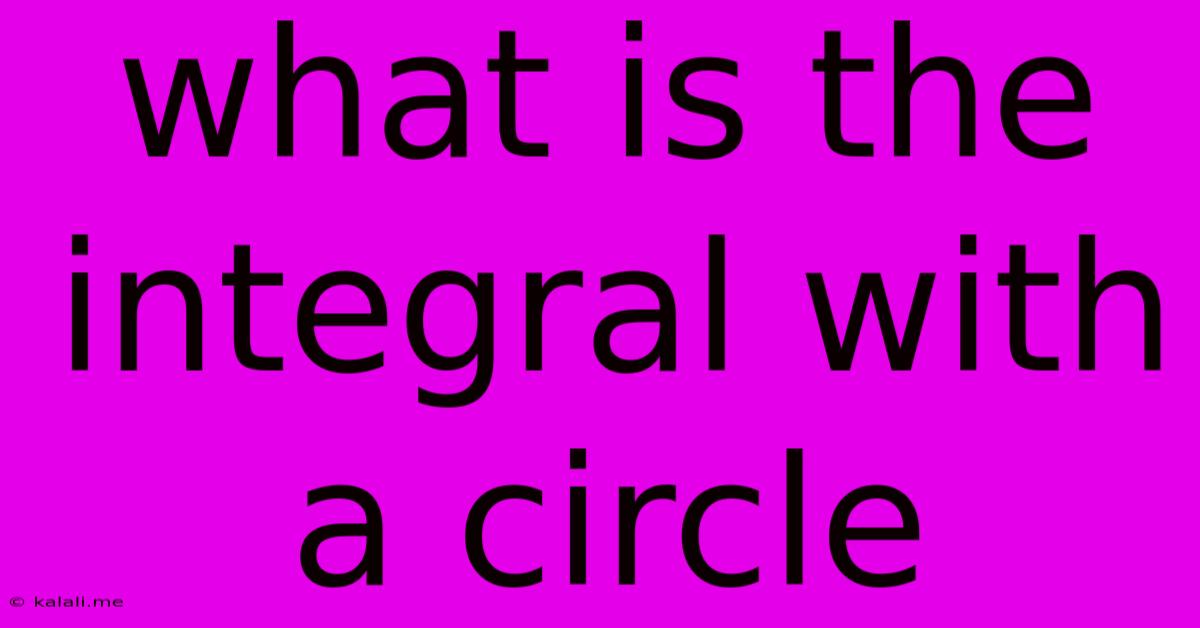What Is The Integral With A Circle
Kalali
Jun 01, 2025 · 3 min read

Table of Contents
What is the Integral with a Circle? Understanding Contour Integrals
The phrase "integral with a circle" usually refers to a contour integral, a concept fundamental in complex analysis. Instead of integrating over a straight line or an interval, we integrate over a curve in the complex plane. This curve is often, but not always, a circle. This article will explore what contour integrals are, how they're calculated, and some of their applications.
What is a Contour Integral?
A contour integral is a generalization of the definite integral in calculus. Instead of integrating a function over a real interval [a, b], we integrate a complex-valued function f(z) over a curve C in the complex plane. This curve C is called a contour, and it can take various shapes, including circles, ellipses, or more complicated curves. The integral is denoted as:
∫<sub>C</sub> f(z) dz
where:
- f(z) is a complex-valued function of a complex variable z.
- C is a smooth curve (or a piecewise smooth curve) in the complex plane.
- dz represents an infinitesimal change in z along the contour C.
Calculating Contour Integrals over Circles
When the contour C is a circle, we often parameterize the curve using complex exponentials. For a circle centered at z<sub>0</sub> with radius r, we can parameterize it as:
z = z<sub>0</sub> + re<sup>iθ</sup>, where θ ranges from 0 to 2π.
Then, dz = ire<sup>iθ</sup>dθ. Substituting this into the integral, we get:
∫<sub>C</sub> f(z) dz = ∫<sub>0</sub><sup>2π</sup> f(z<sub>0</sub> + re<sup>iθ</sup>) ire<sup>iθ</sup> dθ
This transforms the contour integral into a standard definite integral with respect to the real variable θ, which can then be evaluated using calculus techniques. This method is particularly useful for circles because of the simplicity of the parameterization.
Cauchy's Integral Theorem and Formula
Two crucial theorems in complex analysis are intimately connected to contour integrals over circles:
-
Cauchy's Integral Theorem: If f(z) is analytic (holomorphic) within and on a simple closed contour C, then the integral of f(z) around C is zero. This theorem significantly simplifies the calculation of many contour integrals, as it implies that the integral is zero under certain conditions.
-
Cauchy's Integral Formula: If f(z) is analytic within and on a simple closed contour C, and z<sub>0</sub> is a point inside C, then:
f(z<sub>0</sub>) = (1/(2πi)) ∫<sub>C</sub> f(z)/(z - z<sub>0</sub>) dz
This formula allows us to determine the value of an analytic function at a point inside a contour by integrating the function over the contour. It's a powerful tool for evaluating functions and solving various problems in complex analysis.
Applications of Contour Integrals
Contour integrals have wide-ranging applications in various fields, including:
- Physics: Solving problems in electromagnetism, fluid dynamics, and quantum mechanics.
- Engineering: Analyzing electrical circuits and control systems.
- Mathematics: Solving differential equations and proving theorems in complex analysis.
Conclusion
Contour integrals, especially those over circles, are powerful tools in complex analysis. Understanding their calculation and the associated theorems like Cauchy's Integral Theorem and Formula provides a strong foundation for tackling complex problems in various scientific and engineering disciplines. The parameterization technique using complex exponentials is key to evaluating these integrals when the contour is a circle. Remember that the concept extends beyond circles to more complex contours, enriching the field of complex analysis with its versatility and applicability.
Latest Posts
Latest Posts
-
How To Install A Toilet Tank
Jun 03, 2025
-
How Many Amps Can 10 Gauge Wire Handle
Jun 03, 2025
-
Integral Of The Absolute Value Of X
Jun 03, 2025
-
How To Start A Car With A Dead Key Fob
Jun 03, 2025
-
Final Fantasy X Al Bhed Primers
Jun 03, 2025
Related Post
Thank you for visiting our website which covers about What Is The Integral With A Circle . We hope the information provided has been useful to you. Feel free to contact us if you have any questions or need further assistance. See you next time and don't miss to bookmark.